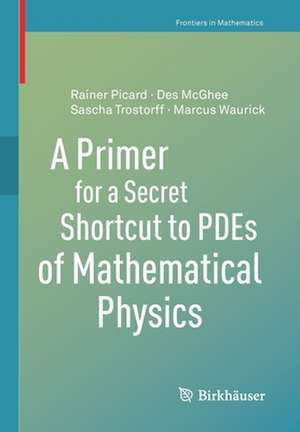A Primer for a Secret Shortcut to PDEs of Mathematical Physics: Frontiers in Mathematics
Autor Des McGhee, Rainer Picard, Sascha Trostorff, Marcus Wauricken Limba Engleză Paperback – 25 aug 2020
The reader should require only a basic foundation in the theory of Hilbert spaces and operators therein. For convenience, however, some of the more technical background requirements are covered in detail in two appendices The theory is kept as elementary as possible, making the material suitable for a senior undergraduate or master’s level course. In addition, researchers in a variety of fields whose work involves partial differential equations and applied operator theory will also greatly benefit from this approach to structuring their mathematical models in order that the general theory can be applied to ensure the essential properties of well-posedness and causality.
Din seria Frontiers in Mathematics
-
 Preț: 491.98 lei
Preț: 491.98 lei -
 Preț: 397.68 lei
Preț: 397.68 lei -
 Preț: 399.60 lei
Preț: 399.60 lei - 15%
 Preț: 490.14 lei
Preț: 490.14 lei -
 Preț: 400.71 lei
Preț: 400.71 lei -
 Preț: 398.72 lei
Preț: 398.72 lei -
 Preț: 416.38 lei
Preț: 416.38 lei -
 Preț: 402.16 lei
Preț: 402.16 lei -
 Preț: 396.64 lei
Preț: 396.64 lei - 15%
 Preț: 649.77 lei
Preț: 649.77 lei -
 Preț: 485.18 lei
Preț: 485.18 lei -
 Preț: 417.30 lei
Preț: 417.30 lei - 15%
 Preț: 703.85 lei
Preț: 703.85 lei -
 Preț: 420.02 lei
Preț: 420.02 lei -
 Preț: 449.35 lei
Preț: 449.35 lei -
 Preț: 426.72 lei
Preț: 426.72 lei -
 Preț: 422.90 lei
Preț: 422.90 lei -
 Preț: 416.34 lei
Preț: 416.34 lei -
 Preț: 414.42 lei
Preț: 414.42 lei -
 Preț: 419.21 lei
Preț: 419.21 lei -
 Preț: 437.34 lei
Preț: 437.34 lei -
 Preț: 417.81 lei
Preț: 417.81 lei -
 Preț: 518.25 lei
Preț: 518.25 lei -
 Preț: 425.08 lei
Preț: 425.08 lei -
 Preț: 482.56 lei
Preț: 482.56 lei -
 Preț: 457.03 lei
Preț: 457.03 lei - 15%
 Preț: 704.17 lei
Preț: 704.17 lei -
 Preț: 448.38 lei
Preț: 448.38 lei -
 Preț: 419.59 lei
Preț: 419.59 lei -
 Preț: 514.00 lei
Preț: 514.00 lei -
 Preț: 432.51 lei
Preț: 432.51 lei -
 Preț: 426.34 lei
Preț: 426.34 lei -
 Preț: 419.43 lei
Preț: 419.43 lei -
 Preț: 487.37 lei
Preț: 487.37 lei -
 Preț: 415.39 lei
Preț: 415.39 lei -
 Preț: 427.33 lei
Preț: 427.33 lei -
 Preț: 276.84 lei
Preț: 276.84 lei -
 Preț: 422.90 lei
Preț: 422.90 lei -
 Preț: 459.92 lei
Preț: 459.92 lei -
 Preț: 422.90 lei
Preț: 422.90 lei -
 Preț: 423.29 lei
Preț: 423.29 lei -
 Preț: 422.90 lei
Preț: 422.90 lei -
 Preț: 416.54 lei
Preț: 416.54 lei -
 Preț: 424.22 lei
Preț: 424.22 lei -
 Preț: 420.02 lei
Preț: 420.02 lei -
 Preț: 419.59 lei
Preț: 419.59 lei -
 Preț: 467.64 lei
Preț: 467.64 lei -
 Preț: 496.72 lei
Preț: 496.72 lei -
 Preț: 422.11 lei
Preț: 422.11 lei
Preț: 417.30 lei
Nou
Puncte Express: 626
Preț estimativ în valută:
79.85€ • 83.21$ • 66.12£
79.85€ • 83.21$ • 66.12£
Carte tipărită la comandă
Livrare economică 03-17 aprilie
Preluare comenzi: 021 569.72.76
Specificații
ISBN-13: 9783030473327
ISBN-10: 3030473325
Ilustrații: X, 183 p. 8 illus. in color.
Dimensiuni: 168 x 240 mm
Greutate: 0.32 kg
Ediția:1st ed. 2020
Editura: Springer International Publishing
Colecția Birkhäuser
Seria Frontiers in Mathematics
Locul publicării:Cham, Switzerland
ISBN-10: 3030473325
Ilustrații: X, 183 p. 8 illus. in color.
Dimensiuni: 168 x 240 mm
Greutate: 0.32 kg
Ediția:1st ed. 2020
Editura: Springer International Publishing
Colecția Birkhäuser
Seria Frontiers in Mathematics
Locul publicării:Cham, Switzerland
Cuprins
Introduction.- The Solution Theory for a Basic Class of Evolutionary Equations.- Some Applications to Models from Physics and Engineering.- But what about the Main Stream?.- Two Supplements for the Toolbox.- Requisites from Functional Analysis.
Notă biografică
Des McGhee is Honorary Lecturer at the University of Strathclyde in Glasgow, Scotland.Rainer Picard is Seniorprofessor at the TU Dresden in Germany.
Sascha Trostorff is lecturer at the Christian-Albrechts-Universität zu Kiel in Germany.
Marcus Waurick Chancellor's Fellow at the University of Strathclyde in Glasgow, Scotland.
Sascha Trostorff is lecturer at the Christian-Albrechts-Universität zu Kiel in Germany.
Marcus Waurick Chancellor's Fellow at the University of Strathclyde in Glasgow, Scotland.
Textul de pe ultima copertă
This book presents a concise introduction to a unified Hilbert space approach to the mathematical modelling of physical phenomena which has been developed over recent years by Picard and his co-workers. The main focus is on time-dependent partial differential equations with a particular structure in the Hilbert space setting that ensures well-posedness and causality, two essential properties of any reasonable model in mathematical physics or engineering. As a unique feature, this powerful tool for tackling time-dependent partial differential equations is subsequently applied to many equations. By means of illustrative examples, from the straightforward to the more complex, the authors show that many of the classical models in mathematical physics as well as more recent models of novel materials and interactions are covered, or can be restructured to be covered, by this unified Hilbert space approach.
The reader should require only a basic foundation in the theory of Hilbert spaces and operators therein. For convenience, however, some of the more technical background requirements are covered in detail in the appendix. The theory is kept as elementary as possible, making the material suitable for a senior undergraduate or master’s level course. In addition, researchers in a variety of fields whose work involves partial differential equations and applied operator theory will also greatly benefit from this approach to structuring their mathematical models in order that the general theory can be applied to ensure the essential properties of well-posedness and causality.
Caracteristici
Presents a way of solving PDEs with very little theory Provides required background knowledge in the appendix Appeals to students and researchers alike
